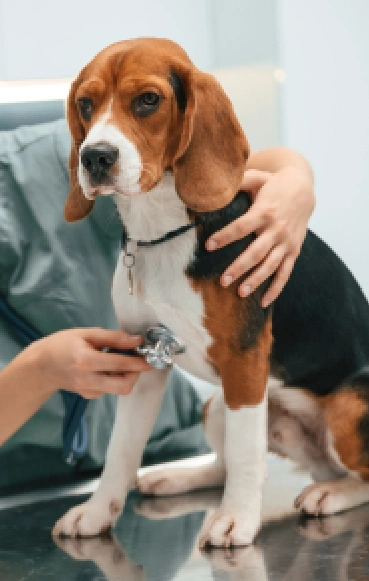Myxomatous Mitral Valve Disease (MMVD) in Dogs
As dogs grow older, certain health issues can quietly develop, and one of the most common is myxomatous mitral valve disease (MMVD). Often, the condition doesn’t show obvious symptoms at first. You might just notice your dog getting tired more quickly on walks, coughing more than usual, or seeming a little off their usual self.
Knowing what MMVD is and spotting the early signs can make a big difference, helping your furry companion stay comfortable and enjoy the best quality of life possible. Keep reading to find out what causes MMVD, how vets diagnose it, and the treatment options that can help manage the condition so your dog stays happy and active.
What Is MMVD?
Myxomatous mitral valve disease (MMVD) is a degenerative disease of the mitral valve, where the valve thickens and stiffens over time, leading to improper closure. This causes blood to leak backwards from the left ventricle into the left atrium when the heart contracts, which impairs the normal flow of blood through the heart.
Also known as mitral valve disease or degenerative mitral valve disease, MMVD is the most common acquired heart problem in dogs. It develops slowly over time, with the mitral valve gradually losing its ability to function efficiently.
This condition is most frequently seen in small breeds, including:
- Cavalier King Charles Spaniel
- Dachshund
- Poodle (including miniature)
- Chihuahua
- Miniature Schnauzer
- Maltese
- Yorkshire Terrier
- Other small and toy breeds like terriers and whippets
Despite being less common, MMVD can also be found in larger breeds.
What Causes Mitral Valve Disease?
MMVD develops due to degeneration of the mitral valve in the heart, though the exact reason this occurs remains unclear. Several factors play a significant role:
- Ageing – MMVD is most common in older dogs, with risk increasing after middle age.
- Genetic Predisposition – Certain breeds, such as Cavalier King Charles Spaniels and Dachshunds, are genetically predisposed because of inherited mutations.
- Small Breed Status – The disease occurs more frequently in small to medium-sized dogs, typically under 20 kilograms. This could be linked to genetic and structural characteristics unique to smaller breeds.
Signs and Symptoms of MMVD in Dogs
Although symptoms can vary with the stage of MMVD, there are some common signs that might indicate your dog’s heart is under strain.
Early Signs
- Heart Murmur – Often the first detectable sign, usually identified during a routine veterinary check-up
- Coughing – Might be more noticeable after exercise or when lying down
- Mild Exercise Intolerance – Dogs might tire easily or slow down during walks
Advanced Signs
- Laboured Breathing – Difficulty or rapid breathing caused by fluid buildup in the lungs (pulmonary oedema)
- Collapse (Syncope) – Fainting or sudden collapse in severe cases
- Lethargy – Noticeable reduction in energy and activity
- Poor Appetite – Reduced interest in food or refusal to eat
MMVD is a progressive condition. In the early stages, your dog might not show obvious signs, aside from a heart murmur detected by a vet. As the mitral valve weakens, it can allow blood to leak backward, a process called mitral regurgitation, forcing the heart to work harder. Over time, this extra strain can cause the heart’s left atrium and ventricle to enlarge, and in some cases, lead to congestive heart failure (CHF).
Diagnosing MMVD
Detecting MMVD involves a thorough veterinary evaluation to understand your dog’s heart health and the stage of the disease. Common diagnostic methods include:
- Veterinary Assessment – A veterinary doctor will review your dog’s medical history and carry out a clinical examination to identify risk factors and any early signs of heart disease.
- Physical Examination – One of the first signs vets often notice is a heart murmur, detected with a stethoscope. This murmur occurs due to abnormal blood flow across the weakened mitral valve.
- Echocardiography (Cardiac Ultrasound) – This imaging test allows vets to see the valve’s structure and function, measure regurgitation, and assess any enlargement of the heart chambers.
- Chest X-rays – X-rays help identify heart enlargement or fluid accumulation in the lungs, which can signal congestive heart failure.
- Blood Pressure Measurement – Keeping track of your dog’s blood pressure is important, as abnormal readings can influence disease progression and treatment.
- NT-proBNP Blood Test – This biomarker indicates cardiac stress and is often raised in dogs with heart disease, helping guide treatment decisions.
At Advanced Vetcare, our vet clinic in Singapore is fully equipped to perform all of these diagnostic tests on-site. Contact us at 6636 1788 (Bedok) or 6565 1788 (Balestier) to schedule an appointment.
MMVD Stages
- Stage A: At-risk breeds with no structural changes or symptoms.
- Stage B1: Valve thickening or prolapse, mild regurgitation, no symptoms or heart enlargement.
- Stage B2: Valve changes with heart enlargement, but no outward symptoms.
- Stage C: Clinical signs of heart failure such as coughing, breathlessness, or fluid buildup.
- Stage D: Refractory heart failure with symptoms persisting despite treatment, requiring advanced or palliative care.
Treatment of Mitral Valve Disease in Dogs
While MMVD cannot be cured, its progression can be controlled to help your dog live longer and enjoy a better quality of life. This typically involves the right combination of medication, simple lifestyle adjustments, and regular monitoring of your dog’s health:
- Medications – These help manage symptoms, support heart function, and reduce fluid buildup associated with heart failure.
- Weight Management – Maintaining a healthy weight lowers stress on the heart.
- Sodium-Restricted Diet – A low-salt diet helps prevent fluid retention and reduces cardiac workload.
- Exercise Limitations – Gentle, controlled activity is encouraged, while strenuous exercise should be avoided.
- Mitral Valve Surgery – Advanced procedures like valve repair, replacement, or TEER may be offered at specialised veterinary centres, though they are less common due to complexity and cost.
- Regular Monitoring – Routine check-ups, echocardiograms, and home observation of breathing rate and activity help detect disease progression early and guide timely treatment adjustments.
Life Expectancy of Dogs with Myxomatous Mitral Valve Disease
- Early Diagnosis (Pre-Symptoms) – Dogs can live several years with proper monitoring and treatment.
- Genetically Predisposed Small Breeds – Median survival is around 12–18 months after diagnosis, though some may live 3–5 years if progression is slow.
- Stage C (Congestive Heart Failure) – Life expectancy typically ranges from 6 months to 2 years with treatment.
- Stage D (Refractory Heart Failure) – Prognosis is poor, with significantly shorter survival despite therapy.
Caring for a Dog Diagnosed with MMVD
- Provide a calm and comfortable setting to help reduce stress, which can exacerbate heart issues.
- Regularly track your dog’s resting breathing rate to detect early signs of heart failure.
- Administer medications consistently as prescribed and monitor for any side effects or changes in response.
- Keep note of changes in your dog’s appetite, energy levels, and overall demeanour.
- Seek immediate veterinary care if your dog experiences increased coughing, laboured breathing, or collapse.
- Schedule regular veterinary check-ups to help adjust treatment plans and monitor disease progression.
Get your dog’s heart checked – Consult us today!
Book a cardiac screening with our vet clinic for your dog and ensure their heart is in the best possible condition.
Contact UsFrequently Asked Questions
What are the risks of not treating MMVD?
Should I spay/neuter a dog with MMVD?
Is myxomatous mitral valve disease in dogs preventable?
MinimallyInvasive
ImprovedQuality of Life
ProactiveCare








